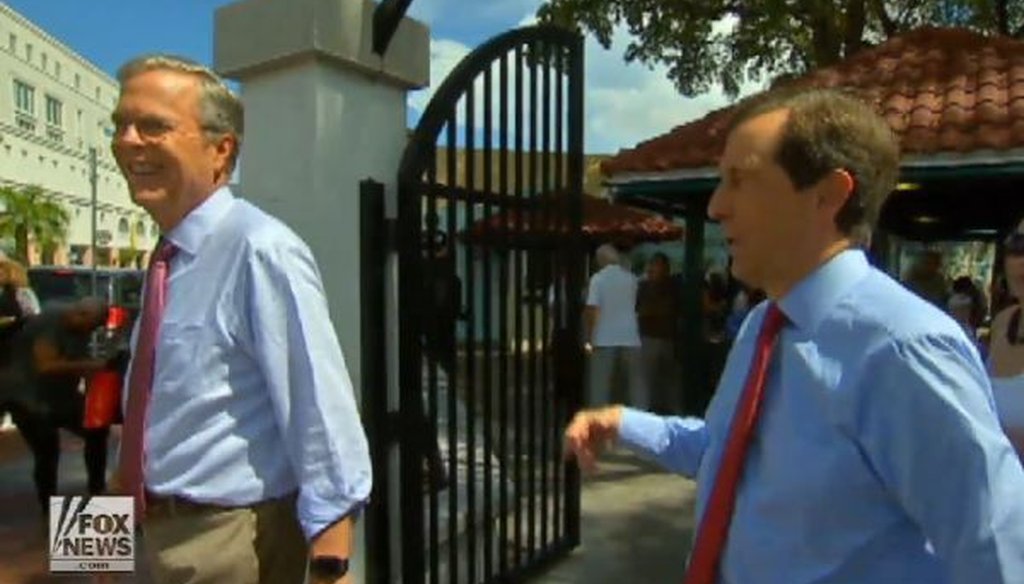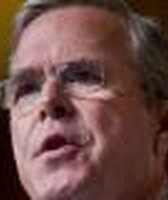Stand up for the facts!
Our only agenda is to publish the truth so you can be an informed participant in democracy.
We need your help.
I would like to contribute

Jeb Bush sat for an interview with Chris Wallace on the Sept. 27 edition of 'Fox News Sunday.'
Jeb Bush says tax policies of George W. Bush 'created a dynamic effect of high growth'
During his 2016 Republican presidential bid, former Florida Gov. Jeb Bush has periodically had to answer for the record of his brother, George W. Bush, and he had to do it again on a recent edition of Fox News Sunday.
Host Chris Wallace asked Bush, "Whether it was Ronald Reagan's tax cuts or your brother's tax cuts, they did add greatly to the deficit."
Bush responded, "They didn't (add to the deficit) as greatly as the static thinkers on the left think. They created a dynamic effect of high growth. And that's what we need."
We didn’t recall rapid economic growth under Bush, so we thought we’d look at the past five presidents’ records in order to gauge Jeb Bush’s comments.
We’ll start by noting that boiling down a president’s policies over one or two terms is tricky. For instance, in Reagan’s case, he is generally thought of as an aggressive tax-cutter, and it’s certainly true that he cut taxes sharply early in his term. But he also raised taxes. We gave a Mostly True rating to a recent claim by TV host Stephen Colbert that Reagan "raised taxes when revenues did not match the expectations."
Sign up for PolitiFact texts
For this reason, we’ll focus here on the most straightforward measure -- overall growth rates under each president.
A look at the numbers
We chose three measurements for comparing the five presidents. The most important statistic is the broadest one: the average annual increase in inflation-adjusted gross domestic product. Here’s a rundown of how the past five presidents have done on that score:
Rank
President
Average annual GDP increase, inflation-adjusted
1
Clinton
3.9
2
Reagan
3.5
3
George H.W. Bush
2.3
4
George W. Bush
2.1
5
Obama
1.4
So by this measure, George W. Bush ranks second to last, undercutting Bush’s argument.
What about the other yardsticks we checked? Bush did a bit better on these, though generally in the middle of the pack.
Here’s how the presidents compare when measured by their single best year of inflation-adjusted GDP growth:
Rank
President
Best year of inflation-adjusted GDP growth
1
Reagan
7.3
2
Clinton
4.7
3
George W. Bush
3.8
4
George H.W. Bush
3.7
5
Obama
2.5
And here’s how the five presidents compare on the number of years the economy exceeded 3 percent growth on their watch.
Rank
President
Featured Fact-check
Number of years of inflation-adjusted GDP growth of 3 percent or more
1 (tie)
Clinton
6
1 (tie)
Reagan
6
3 (tie)
George W. Bush
2
3 (tie)
George H.W. Bush
2
5
Obama
0
So Bush fares better on these other two measurements, but he still trails the two clear frontrunners in economic growth, Clinton and Reagan.
Comparing Bush and Obama
We should note that George W. Bush’s record on GDP growth does outpace Obama’s on each score, so to the extent that Jeb Bush was using Obama -- the president Bush hopes to succeed -- as a foil, he has a point. Still, it’s an exaggeration to tout George W. Bush’s economic record as one of "high growth" when compared to the records of Clinton and Reagan, and even to Bush’s father.
As for Obama’s record, we’ll note that -- as low as it is on our rankings -- it’s still a work in progress.
To calculate Obama’s record, we included the first two quarters of 2015. (Data for the third quarter is set to be released in October.) Given that Obama came into office in the midst of the Great Recession and that the recovery on his watch has been accelerating since 2010 -- albeit slowly -- Obama may ultimately overtake Bush when his final tally is available. Second-quarter growth for 2015 was 3.9 percent, which could suggest continued economic improvement in the months ahead.
The Bush campaign’s response
When we checked with Jeb Bush’s campaign, they made the point that because Wallace’s question referred to both Reagan and George W. Bush, Jeb Bush’s response was intended to refer to both presidents. But Reagan’s record on tax cuts was far more mixed than Bush’s; Reagan signed off on several significant tax increases.
The Bush campaign also told PolitiFact that George W. Bush’s record is hampered by beginning with the economic impact of the 9/11 attacks and the bursting of the dot-com bubble. However, the same argument could be made -- and made even more strongly -- with the Great Recession inherited by Obama.
Allocating credit and blame
Finally, we will raise an issue that’s always relevant when comparing presidents on economic growth: It’s hard to determine credit or blame for economic performance on a president’s watch, because factors outside their control, from energy-price shocks to technological changes to pure luck, can have a significant impact. In addition, it’s unclear how much a president can influence the broader economy during their first year or two in office; for that early period, the legacy of their predecessor may have a greater impact.
"The economics research is mixed as to how much federal tax policies can affect economic growth," said Tara Sinclair, a George Washington University economist and chief economist at the jobs site Indeed.
Our ruling
Jeb Bush said the tax policies of George W. Bush "created a dynamic effect of high growth."
The definition of "high," of course, is relative, but if you look at the most directly comparable examples -- the past five presidents’ records in average, annual, inflation-adjusted growth in gross domestic product -- George W. Bush ranked fourth among the five presidents, and trailed the two strongest presidents in this regard, Clinton and Reagan, by a particularly wide margin. (Reagan’s policies included both tax cuts and tax increases.)
Bush has so far maintained a lead over Obama, although Obama’s tenure is not finished yet. Still, it’s always worth noting that a president’s impact on the economy is not all-encompassing.
Overall, though, the evidence doesn’t show that high growth occurred in the wake of the Bush tax cuts. We rate the claim Mostly False.
Our Sources
Jeb Bush, comments on Fox News Sunday, Sept. 27, 2015
U.S. Bureau of Economic Analysis, Table 1.1.1. Percent Change From Preceding Period in Real Gross Domestic Product, accessed Sept. 27, 2015
Email interview with Tara Sinclair, George Washington University economist and chief economist at the jobs site Indeed, Sept. 27, 2015,
Browse the Truth-O-Meter
More by Louis Jacobson
Jeb Bush says tax policies of George W. Bush 'created a dynamic effect of high growth'
Support independent fact-checking.
Become a member!
In a world of wild talk and fake news, help us stand up for the facts.


















































